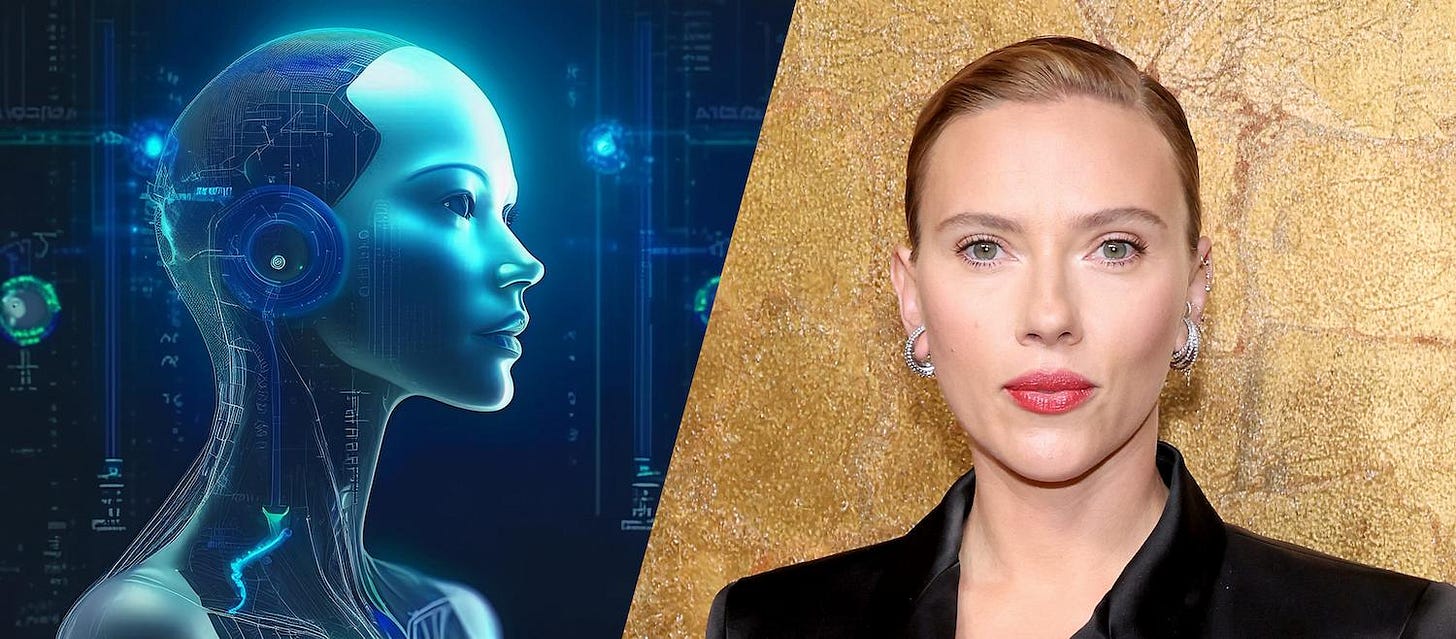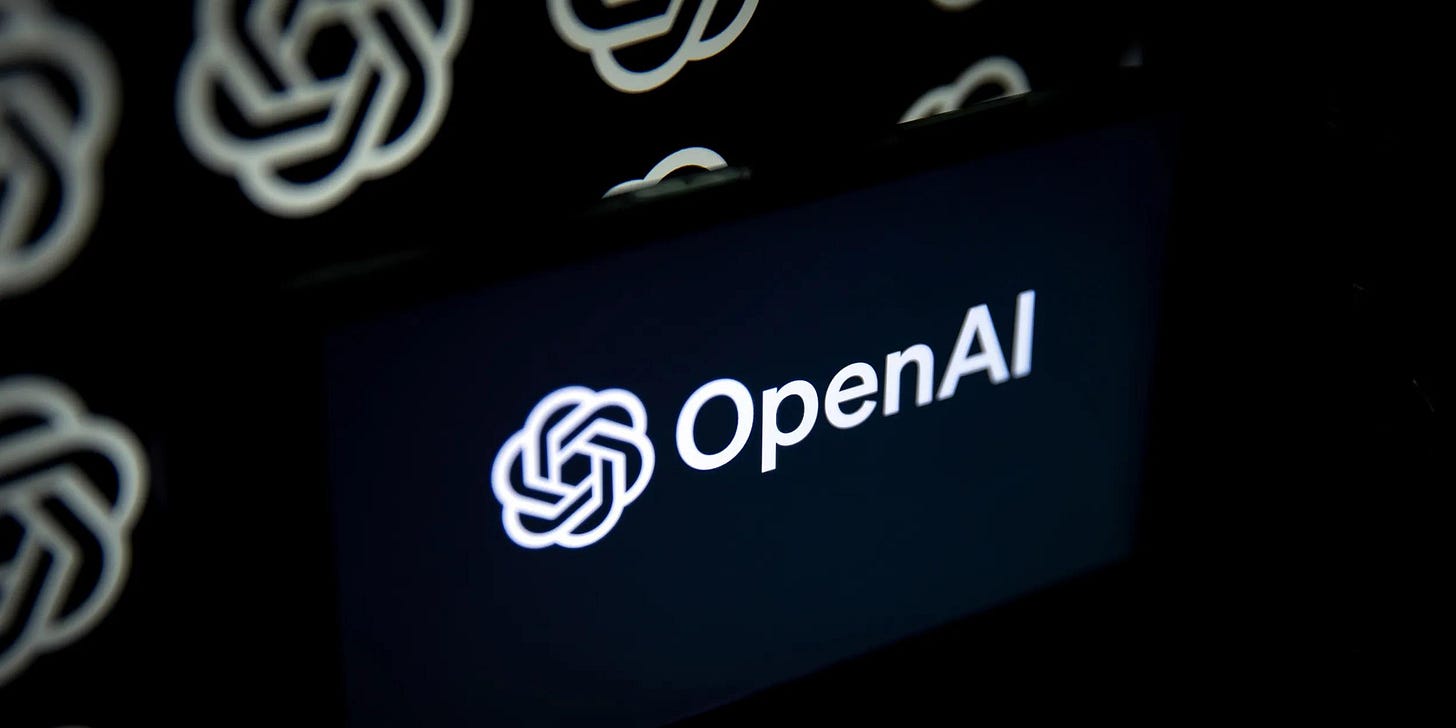Microsoft's Big Reveal 🚀
Microsoft's AI dominance, Johansson's voice controversy, Samsung's trolls Apple, and more highlights.
This Week in AI #11
Microsoft solidifies AI dominance. Once again at the bleeding edge of AI, their ability to ship hardware + software at scale, combined with strategic investments, positions them as the current leader in the AI race.
This week I want to take a moment and sincerely thank everyone who shares This Week in AI, in particular James Staltari who’s keen interest in AI is shaping innovative solutions at Sime Darby.
Let’s get into it!
"It's not about innovation that is only useful for a few. It's about really being able to empower everyone."
Microsoft CEO Satya Nadella
Microsoft Build 2024: The Next Wave of AI Innovation
Microsoft's annual developer conference, Build 2024, unveiled a series of groundbreaking AI advancements, solidifying the company's position as a leader in the field.
The event, akin to Google I/O and OpenAI's gatherings, showcased Microsoft's commitment to empowering developers and transforming industries through AI.
Why it matters:
The announcements at Build 2024 highlight the growing significance of AI in shaping the future of technology and business.
Microsoft's focus on real-time intelligence, multimodal models, and collaborative AI tools like Team Copilot demonstrates the company's dedication to making AI accessible and impactful across various domains, from education to software development.
📝 Overview on Microsoft's blog
𝕏 Excellent Mind Branch map of all of the announcements
Microsoft Unveils AI-Powered Copilot+ PCs, A New Era for Windows
Microsoft has launched a new category of Windows PCs called Copilot+ PCs, designed to harness the power of AI for enhanced productivity and creativity.
Why it matters:
Copilot+ PCs represent a significant leap forward in personal computing, integrating AI capabilities directly into the device for faster, more efficient, and personalised experiences.
Key Features:
Recall: This feature acts like a photographic memory for your PC, allowing you to easily find content you've previously seen or worked on.
Cocreator: Built into Windows, this feature enables you to generate and edit images using AI, either by combining ink strokes with text prompts or by restyling existing photos.
Live Captions: This feature provides real-time translations of audio into English subtitles, supporting over 40 languages.
Windows Studio Effects: These effects automatically enhance your appearance and sound in video calls, with features like portrait light, eye contact, and voice focus.
Copilot: This AI assistant is integrated into the PC and can be accessed with a single tap, offering features like voice conversations and personalised assistance.
📝 Microsoft article on the new releases
Scarlett Johansson "Shocked, Angered" by ChatGPT's Voice
Actress Scarlett Johansson is demanding answers from OpenAI after the company's latest ChatGPT demo featured an AI voice eerily similar to her own.
Johansson, who famously voiced the AI in the 2013 film "Her," claims OpenAI CEO Sam Altman courted her for the project due to the emotional connection her voice brought to the film, but she declined.
She was then surprised to hear the strikingly similar voice in the demo.
Why it matters:
This incident raises significant concerns about intellectual property rights and the potential misuse of AI technology to replicate a person's likeness without consent.
Johansson's case could set a precedent for how such disputes are handled in the future, and it underscores the need for clear guidelines and regulations in the rapidly evolving field of AI.
Samsung Trolls Apple with 'UnCrush' Video in Response to iPad Pro Ad
Following Apple's controversial "Crush" ad, Samsung has once again taken a jab at its competitor with a playful video titled "UnCrush."
The video showcases a woman playing a guitar salvaged from the wreckage of Apple's crushed items, using a Samsung Galaxy Tab S9 for sheet music.
Why it matters:
Samsung's response highlights the distinction between Apple's portrayal of technology and Samsung's. In Apple's "Crush" ad, the iPad Pro emerged from a crushing machine, suggesting that creativity is replaced or enhanced by technology.
Samsung's "UnCrush" video, on the other hand, portrays technology as a tool that empowers human creativity.
This playful exchange also reflects the broader conversation about technology's impact on creativity and artistic expression.
Ilya’s Optimistic Vision for the Future of AI
In his TED Talk, Ilya Sutskever, co-founder and ex chief scientist of OpenAI, paints a vivid picture of the future of artificial intelligence (AI), where digital brains surpass human intelligence.
While acknowledging potential risks, Sutskever expresses optimism, highlighting a growing collaborative spirit amongst AI researchers and the public's increasing awareness of AI's potential impact.
Why it matters:
Sutskever's insights are particularly significant due to his pivotal role in shaping the AI landscape. His optimistic outlook offers a counterpoint to the often-expressed fears surrounding AI's rapid advancement.
His emphasis on collaboration as a key to addressing the challenges and ensuring positive outcomes resonates with the broader ethical debate surrounding AI development and deployment.
Google CEO Sundar Pichai on the Future of AI and Search
In a recent interview, Google CEO Sundar Pichai discussed the integration of AI into Google Search and its potential impact on the web.
Pichai acknowledged concerns about AI-generated content and its effect on website traffic, but remained optimistic about the future of the web and Google's commitment to delivering high-quality search results.
Why it matters:
The conversation highlights the ongoing debate about the role of AI in shaping the future of the internet.
As AI-powered tools become more sophisticated, questions arise about the balance between innovation and the potential disruption of existing ecosystems.
Pichai's insights offer a glimpse into Google's perspective on these challenges and its efforts to navigate the evolving landscape of AI and search.
OpenAI's Safety Team Implodes
OpenAI has recently witnessed the departure of its entire safety team, including key figures like Ilya Sutskever and Jan Leike.
This exodus has sparked concerns about the company's commitment to mitigating potential risks associated with increasingly powerful AI systems.
Why it matters:
The departure of the safety team comes at a critical juncture in AI development, as fears of unaligned AI systems and potential harm to humanity continue to be a topic of much debate.
While some experts warn of an "AI apocalypse," others believe these fears may be overhyped. Regardless, the recent exodus raises important questions about the balance between innovation and safety in the AI field.
A New Era of Human-Computer Interaction
The Dawn of Intent-Based Interaction
AI is ushering in a monumental shift in how we interact with technology, marking the most significant change in user interface (UI) design in over six decades.
This groundbreaking shift introduces a new paradigm: intent-based interaction.
Unlike the traditional command-based approach, where users instruct the computer on how to perform tasks, intent-based interaction allows users to simply state their desired outcome, leaving the AI to determine the best way to achieve it.
From Punch Cards to Prompts: A Brief History
The evolution of UI paradigms is a testament to technological progress. The first paradigm, batch processing, involved submitting a complete set of instructions to the computer and waiting for the output.
This was followed by the command-based interaction paradigm, which revolutionized user experience by introducing a turn-based dialogue between user and computer.
Now, with the advent of AI, we are witnessing the rise of intent-based interaction, where user intent takes center stage.
The Need for AI Experience (AIX)
As AI becomes increasingly integrated into our lives, it is crucial to re-evaluate our approach to user experience (UX) design.
Traditional UX, which focuses on usability and momentary interactions, is inadequate for AI systems that exhibit autonomy, learning, and engagement in complex social and emotional dynamics.
This necessitates the development of a new paradigm: AI Experience (AIX). AIX focuses on designing for the unique capabilities of AI as agentic systems, ensuring that interactions are not only functional but also emotionally and socially fulfilling.
Shaping the Future of Human-AI Interaction
The transition to AI-powered user experiences is a transformative moment in our relationship with technology.
By embracing AIX, we can ensure that AI technologies not only serve our needs but also enhance our lives by fostering positive, empathetic, and effective interactions.
As we continue to explore the potential of AI, AIX provides the necessary framework to navigate this new era of coexistence with intelligent systems, shaping a future where humans and AI collaborate more closely and meaningfully than ever before.
📰 Article by Neilson Norman Group
Hinton's Insights on AI, Collaboration with Sutskever, and Intuition's Power
In this video, AI pioneer Geoffrey Hinton discusses his work with Ilya Sutskever, the co-founder and ex chief scientist of OpenAI, highlighting Sutskever's early contributions and remarkable intuition in the field of artificial intelligence.
Hinton emphasises the importance of selecting impactful research problems and trusting one's intuition, drawing from his own experiences and breakthroughs.
Why it matters:
Hinton's insights are particularly valuable given his stature as a Turing Award winner and a leading figure in AI research.
His emphasis on collaboration and mentorship underscores the importance of nurturing young talent in the field.
Additionally, his reflections on problem selection and the role of intuition offer guidance for researchers and practitioners navigating the complexities of AI development.




